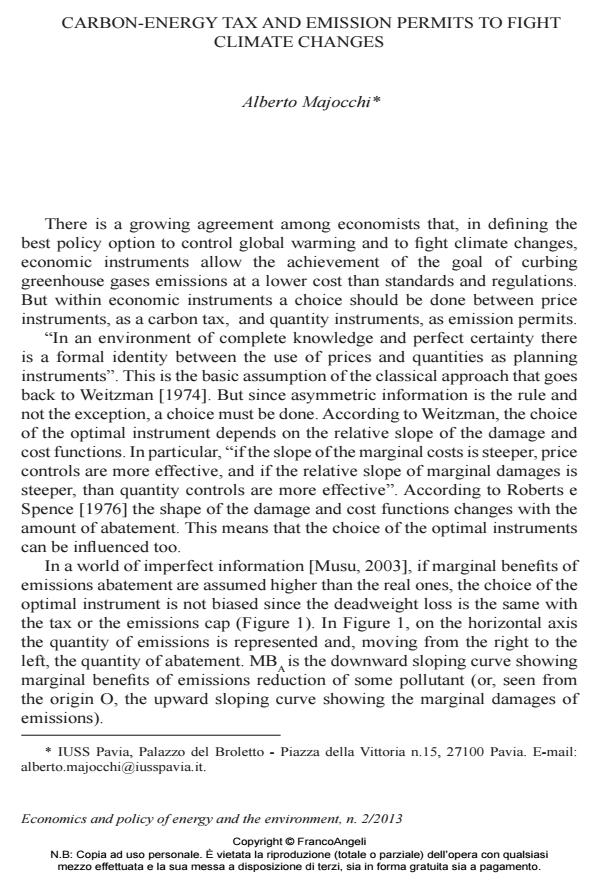Carbon-energy tax and emission permits to fight climate changes
Journal title ECONOMICS AND POLICY OF ENERGY AND THE ENVIRONMENT
Author/s Alberto Majocchi
Publishing Year 2013 Issue 2013/2
Language English Pages 15 P. 113-127 File size 396 KB
DOI 10.3280/EFE2013-002007
DOI is like a bar code for intellectual property: to have more infomation
click here
Below, you can see the article first page
If you want to buy this article in PDF format, you can do it, following the instructions to buy download credits

FrancoAngeli is member of Publishers International Linking Association, Inc (PILA), a not-for-profit association which run the CrossRef service enabling links to and from online scholarly content.
This paper discusses the proposal of European Community to introduce a carbon- energy tax with the aim to curb greenhouse gas emissions. Nevertheless the relative successful of this initiative, the volatility of the prices of permits and firms free allocation of permits may undermine the achievement of the emissions permits goals. Therefore,the problem of global warming should be addressed using both quantity and price economic instruments, i.e. that the emission trading scheme should be complemented by a carbon-energy tax. Moreover, it is necesary to move towards a tax on consumption of carbon rather than on carbon production. Finally, environmental federalism could be seen as the direction for implementing the combined system of tax and permits.
Keywords: Carbon-energy tax, Carbon emission trading, Price volatility, Climate change JEL classification: H41; Q53
- Bovenberg A.L. (1999). Green Tax Reforms and the Double Dividend: An Updated Reader’s Guide. International Tax and Public Finance, 6, 3: 421-443. DOI: 10.1023/A:1008715920337
- Delbeke J. (ed.) (2006). EU Energy Law. Leuven: Claeis&Casteels.
- European Commission (2011). Smarter energy taxation for the EU: proposal for a revision of the Energy Taxation Directive, Brussels, COM(2011)168/3.
- Goulder L.H. (1995). Environmental Taxation and the ‘double dividend’: A Reader’s Guide. Internationl Tax and Public Finance, 2, 2: 157-183. DOI: 10.1007/BF00877495
- Helm D.R., Smale R., Philipps J. (2007). Too good to be true? The UK’s Climate Change Record. Oxford, New College, December.
- Helm D. (2010). The Case for a Carbon Tax. In: Less S., Greener, Cheeper, Policy Exchange, UK.
- Laurent E., Le Cacheux J. (2009). An ever less carbonated Union? Towards a better European taxation against climate change, Notre Europe, Série “Etudes et Recherches”, No. 74.
- Majocchi A., Missaglia M. (2003). Environmental Taxes and Border Tax Adjustment,. In: Milne J. (ed.) Critical Issues in Environmental Taxation. International and Comparative Perspective, Volume I. Richmond, pp. 343-362.
- Metcalf G.E. (2009). Market-based Policy Options to Control U.S. Greenhouse Gas Emissions. The Journal of Economic Perspectives, 23, 2: 5-27. DOI: 10.1257/jep.23.2.5
- Musu I. (2003). Introduzione all’economia dell’ambiente. Bologna: il Mulino.
- Roberts M.J., Spence M. (1976). Effluent Charges and Licenses under Uncertainty. Journal of Environmental Economics and Management, 5: 193-208.
- Weitzman M.L. (1974). Prices vs. Quantities. The Review of Economic Studies, October, 477-491. DOI: 10.2307/2296698
- Introduction National Energy and Climate Plans in perspective: How can we strike a balance between the desirable and the sustainable? Luigi De Paoli, Patrice Geoffron, in ECONOMICS AND POLICY OF ENERGY AND THE ENVIRONMENT 1/2024 pp.15
DOI: 10.3280/EFE2024-001002 - The EU climate and energy policy: what about the new targets for 2030? Luigi De Paoli, in ECONOMICS AND POLICY OF ENERGY AND THE ENVIRONMENT 1/2014 pp.27
DOI: 10.3280/EFE2014-001002
Alberto Majocchi, Carbon-energy tax and emission permits to fight climate changes in "ECONOMICS AND POLICY OF ENERGY AND THE ENVIRONMENT" 2/2013, pp 113-127, DOI: 10.3280/EFE2013-002007